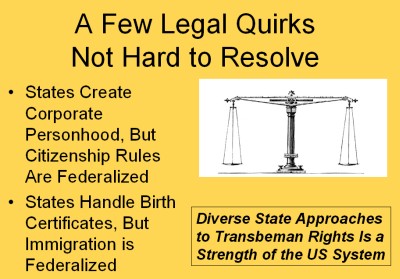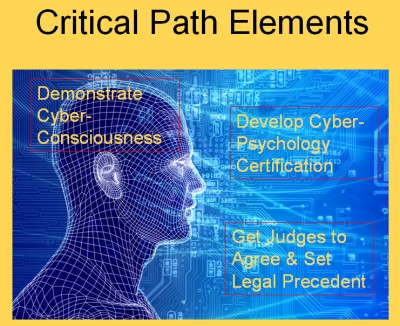Pros & Cons of Corporate Personhood for Transbemans
Martine Rothblatt, Ph.D.
Page 4 of 4
My suggested approach treats each new transbeman like an immigrant. Really, that's what they are. Instead of immigrating from another physical space, they're immigrating from another conceptual space. From cyber space into our socio-political space. Let those who arrive live, work, save, and have due process rights. I know that's a radical notion to many in this day and age but that would be my point of view. Let those that want and warrant citizenship via the real-life test have it, which is more or less exactly what we do with immigrants who desire U.S. citizenship. There are a few legal quirks, but I don't really think any of them are that hard to resolve.

States actually create corporate personhood. The word "corporation" does not appear in the U.S. Constitution. The ability to grant corporate charters is completely left up to the fifty states. On the other hand, in the early years of the Republic different states were adopting different rules for who could become a U.S. citizen. Citizenship rules are federalized, but the states determine corporate personhood. That's really neat because what we'll end up with are diverse state approaches. It was mentioned that Massachusetts might be the first state to grant citizenship to transbemans because it was the first state to recognize same-sex marriage. Frankly, I think there will be so much value and benefit created by transbemans that more progressive states will compete with each other to provide a favorable environment for granting a corporate personhood status to transbemans.
The federal law says that any natural born citizen, anybody with a birth certificate from a U.S. state, is a U.S. citizen. But if you immigrate into the U.S. then the citizenship rules are federalized and they've got common immigration citizenship rules.
When the vital records office gets a letter from a judge that says erase this person's birth mother and put the name of this adoptive mother in place on the birth certificate, that's exactly what the registrar does. When the registrar gets a letter from a judge saying erase that F on the birth certificate and put an M, that's exactly what the registrar does. When a judge orders a vital records department to grant a birth certificate that says BINA48 on it, father unknown, mother unknown, the registrar would be compelled to do it. That BINA48 would then be a natural born U.S. citizen and would have full U.S. rights.

My last slide identifies what I think are the critical path elements for this solution to the conundrum of transbeman citizenship and personhood. First of all, we need to demonstrate cyber consciousness. I don't think anything legally is going to be accomplished unless we actually demonstrate cyber consciousness. The Colloquia on the Law of Outer Space started when we had just thrown a grapefruit into orbit – Sputnik [1]. It was a spiky grapefruit, but it was a grapefruit. The first treaty didn't come until 1967. By that point in time we had the Gemini Program [2] and objects had been landed on the moon and we were on the cusp of moving them around the moon. There were plans afoot to land on the moon. It was the reality of space development that hastened space law and it will be the reality of demonstrating cyber consciousness that will hasten transbeman law.
The second key element of the critical path is to develop a cyber psychology certification. I have yet to meet a cyber psychiatrist. My favorite one in fiction was a lay cyber psychiatrist. His name was Mannie in Moon is a Harsh Mistress [3]. He wasn't a psychiatrist at all but he realized very quickly the key principle of psychiatry, which Freud had elucidated as getting people to just talk. Talking is the window to the soul. And when Michael, the computer in Moon is a Harsh Mistress, was acting quirky, Mannie would just go in and talk to Michael and make Michael feel wanted and loved. I haven't run into a cyber psychologist but I really encourage people to develop that field and further develop standards similar as there are to all the other different specializations of psychiatry. There are, by the way, three dozen different specializations of psychiatry.
Finally, get judges to set legal precedent. I disagree a little bit with my esteemed colleague, Gene Natale [4], that I don't think it's a bad thing for different states to have different views. If somebody wants to live in a state where transbemans are treated as second-class citizens, the nice thing about having fifty states is the odds are that you'll find a state like that. If other people want to live in more advanced futuristic states, they'd have that freedom too. I think a good thing about a federalist system is that it's very Darwinian because you're allowed to have a lot of different experiments of different states going places.
Footnotes
1. Sputnik - History changed on October 4, 1957, when the Soviet Union successfully launched Sputnik I. The world's first artificial satellite was about the size of a beach ball (58 cm.or 22.8 inches in diameter), weighed only 83.6 kg. or 183.9 pounds, and took about 98 minutes to orbit the Earth on its elliptical path. That launch ushered in new political, military, technological, and scientific developments. While the Sputnik launch was a single event, it marked the start of the space age and the U.S.-U.S.S.R space race.
http://history.nasa.gov/sputnik/ October 8, 2008 3:12PM EST
2. Gemini Program - The National Aeronautics and Space Administration announced December 7, 1961, a plan to extend the existing manned space flight program by development of a two-man spacecraft. The program was officially designated Gemini on January 3, 1962. It was named after the third constellation of the zodiac, featuring the twin stars Castor and Pollux. The program was operationally completed with the Gemini XII flight.
http://www-pao.ksc.nasa.gov/... October 8, 2008 3:15PM EST
3. The Moon is a Harsh Mistress - a 1966 science fiction novel by American writer Robert A. Heinlein, about a lunar colony's revolt against rule from Earth. The novel expresses and discusses libertarian ideals in a speculative context.
http://en.wikipedia.org/... October 8, 2008 3:21PM EST
4. Gene Natale - B.A. St. John’s University; J.D., New York Law School. He was an Associate Editor of his Law Review, and participant in an appellate advocacy program. He served as a Summer Assistant U.S. Attorney, investigating and prosecuting co-conspirators in complex multi-million dollar governmental fraud schemes, an Assistant District Attorney, serving in the Grand Jury Bureau, Investigations Bureau, and Narcotics Bureau, was appointed Examining Attorney for the Department of Investigations, responsible for the investigation of corruption in city government, and appointed appointments included Village Board Trustee and Associate Village Justice. Gene has taught hundreds of Paralegal and Business Law classes at Keiser University, in Melbourne, FL.
http://terasemjournals.org/pc0203/bina48j5.html October 8, 2008 4:12PM EST
Bio
 Martine Rothblatt, J.D., MBA, Ph.D.
Martine Rothblatt, J.D., MBA, Ph.D.
Started the satellite vehicle tracking and satellite radio industries and is the Chairman of United Therapeutics, a biotechnology company headquartered in Silver Springs, Maryland.
Dr. Rothblatt is also the President of Terasem Movement, Inc. and has written several books, including The Apartheid of Sex, Two Stars for Peace, Unzipped Genes, and Your Life or Mine.